Adapting to Change (Day 1)
Wednesday, December 8, 2021
Submitted by JJ Bebb
The December session of the Karl program kicked off with a lunch at Brick + Motor Social House with everyone arriving and fellowshipping together. After lunch members of our group made their way across the street to Block 22 to begin the journey of Southeast Kansas. We were welcomed by Blake Benson (president of Pittsburg area chamber) as well as Pam Henderson mayor of Pittsburg. We learned that Pittsburgh has developed $500 million in capitol building investments and were ranked in the following order:
1. Industry 2. Pitt State University 3. Housing development 4. Medical facilities.
There are currently 4 housing developments in progression to offer more housing solutions to those wishing to work and live in town. A new Industrial Park with rail access with off-loading capabilities has recently been built to attract and maintain manufacturing facilities. We heard about how sales tax revenues for 2020 where up 3.4% and that 2021 was up even more at 8.5%. Unemployment is currently around 3.3%.
A free healthcare center has been started in southeast Kansas as well and are utilizing the opportunity to attract doctors in the training stage with hopes that they will stay and want to raise a family in southeast Kansas. A fairly new state-owned casino was also discussed and how it is keeping revenue in state instead of people driving south into Oklahoma to gamble.
The population of Pittsburgh has been steady at 20K for nearly the last 100 years, which was pointed out is very rare. Current issues that are a problem for this area were discussed and as follows: workforce development, child care, available housing build sites, lack of a 4-lane highway through town, and low health rankings.
On the plus side Pittsburgh recently got a forward-thinking city manager and is working towards fixing some of the infrastructure issues. One thing that everyone was very interested in was hearing that there are 8 fried chicken joints around the area and that Food Network channel has been here showcasing them.
We heard from Dr. Shawn Naccarato from PSU on how Block 22 and Brick + Mortar came to be and the role the college played in creating new life in downtown that others would soon follow. Mary Louise told how she is passionate about small towns rural America, preserving communities, and renovating old buildings. We then toured the building and saw the coworker center; coffee shop and the offices that different business has set up shop in.
Dr. Tim Dawsey with the PSU polymer research center talked about how polymers are used in everyday items in almost everything. They have started a FARMS workshop seminar that brings ag producers and scientists together to teach other about what is needed in the ag industry and how polymers can be utilized more.
Tiffany Trump from Trump tours was also on had to answer questions about the trip to UAE.
Supper that evening was very good and was catered by Pichler’s Chicken Annies.
Dr. Vincent Amanor-Boadu a KSU ag econ professor then discussed Change as an Opportunity with us. He explained that perspective is everything, dealing with change is our choice and advised us to figuratively plant a tree so others can sit under it and enjoy the shade. These minutes provided by the very lacking in talent but ever popular J.J. Bebb
Adapting to Change (Day 2)
Thursday, December 9, 2021
Submitted by Kayla Jarvis
Day 2 of Class XV’s Adapting to Change seminar began by loading on to a school bus first thing in the morning. Scott Williams, a retired NCRS and local, was our tour guide for the day.
To tell the story of Southeast Kansas we would need to get off the paved roads.
As we travelled to our first stop of the day Scott shared stories ranging from Mafia ties in Chicago in the area to the important of schools in the community.
Our first stop was at a watering hole in a pasture. Scott explained that the standing water in that pasture was a 3 on the acid scale… battery acid is a 2.
Multiple scientists have studied the water but no conclusion of where the water is coming from has been reached. Apparently, the cattle in the pasture do drink the water and are not harmed by it.
Our next stop on the tour was the Big Brutus museum. I had heard it was impressive but was not prepared for the actual size of Brutus!
The machine took 11 months to assemble and was only in operation for 11 years.
We were privileged to hear from Dave Kimey, who was an operator of big Brutus all 11 years Dave is a local who has worked in all aspects of coal mining.
Brutus never dug any coal, only the overburden to make room for the coal mines.
After the Big Brutus Museum in West Mineral, we loaded back on the bus and headed to Cabin 19 mine site.
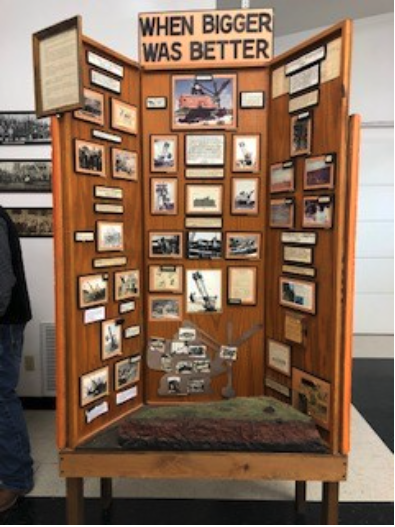
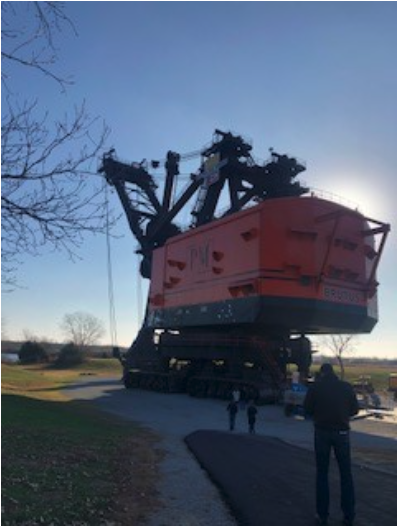
The state had acquired 28,000 acres of abandoned coal mines and have turned it into trout fishing ponds and camping sites that are booked close to year-round.
Near the Cabin 19 site, Scott took the group into a hidden state-owned EPA hazard, the state has yet to come back and finish cleaning up the abandoned coal mining site.
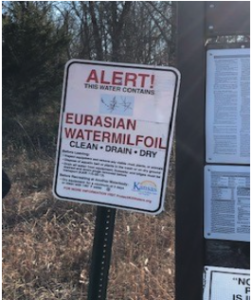
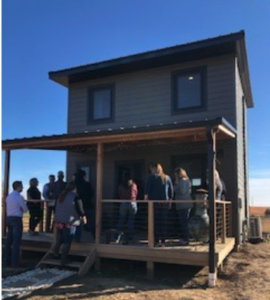
The body of water at this site could potentially run into a water source for a nearby community.
Our next stop for the day was at the Crossland Construction headquarters for lunch and our midday speakers in Columbus, KS.
Abby Nelson of Micro Mansions shared with the group the challenge she saw in Wichita trying to buy new housing. Her solution: Micro Mansions.
This is a startup company that Abby is building with the help of Crossland Construction. Her goal is to keep all the homes under $150,000 and under 1,000 square feet. As of the day we visited, Abby was approved to hire on 3 employees.
Her project right now is to perfect her ready to build Micro Mansion kits to ship across the Midwest. Later in our tour we met up with Abby at her very own micro mansion and toured the house.
Next Sammy Swanwick, Talent Development Manager at Crossland shared with the KARL class the leadership opportunities that Crossland provides for its younger employees.
Crossland has internships and partnerships with high schools and colleges in the 4-state area to find and grow home grown talent to stay and work for Crossland. The company employs 1500 people and has been in operation for over 40 years. Started in a garage in Treece, KS.
Crossland has grown to be on of the top construction companies in the nation and still growing. Liz Simpson of Crossland then spoke with the class about her work in community development with Crossland.
Her initiative in the company is to make Columbus, KS more appealing for executives to stay and live.
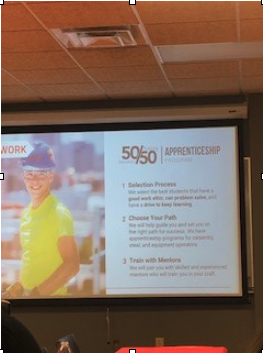
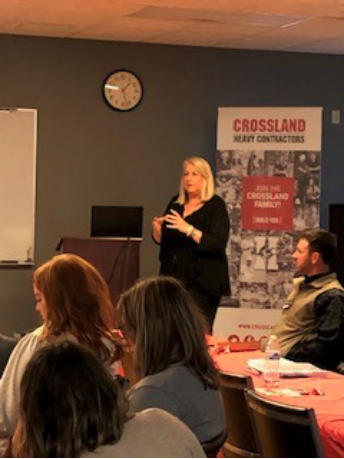
Crossland has built the community city parks, soccer fields, walking trails, a splash pad, youth athletic programs, farmers markets, community childcare center and Red Iron activity center. We loaded back on the bus with Liz to tour all the areas in town that Crossland has helped to improve
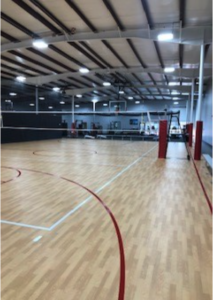
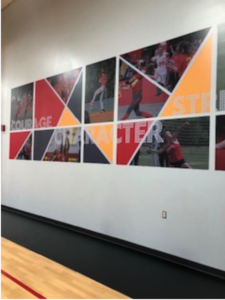
Our final tour destination for the day was heading south to Treece, KS and Pitcher, OK. Driving through these ghost towns was surreal. Both communities had been devasted by the aftermath of zinc and iron mining in the area. The government had found cancer causing toxins in the area and deemed the two towns uninhabitable. A tornado has also gone through Treece, all that is left of the town is roads, foundations of old buildings and chat piles the size of football fields. Tour guide Scott indicated to the class the citizens of these towns are not pleased with their situation. The abandoned towns were a clear symbol of the consequences of mining in the area.
To end the day our class gathered for supper sponsored by the Burns family. We were also joined by Judge Tommy Webb. Judge Webb shared with the KARL class his emotional life story of growing up basically an orphan in Korea and his adoption story in the United States. Judge Webb’s message was to not judge people because we do not know where they are coming from. He shared with us that the most important thing to do is just love and value those around you. Judge Webb in his career has helped many children get out of similar situations to his in southeast Kansas and Oklahoma. He left the class with a powerful challenge of friendliness and love to everyone we encounter because we do not know the tree they have came from.
Adapting to Change (Day 3)
Friday, December 10, 2021
Submitted by Justin Kastner
After a robust breakfast at Holiday Inn Express & Suites, Stew Cauble (chair) convened the KARL in true fashionable style—sporting a light blue-checked shirt and khaki trousers.
KARL board member Jancey Hall (Class XIV) briefly addressed the group, noting the following:
– As we look to the end of the KARL experience, we all need to be thinking about what we want to “take from it.”
– One forthcoming expectation for our class is that we come up with a “project” of some kind that would, in effect, “give back” to the KARL program. Everyone should begin to contemplate/ brainstorm possible projects (e.g., fundraiser, etc.). At the January 2022 KARL seminar in Wichita, 30 minutes will be dedicated to a class-wide discussion of possible projects.
– Keeping in mind the June 4 “graduation date,” we should be thinking about nominating/electing a member of our class to serve on the board, on behalf of the class. There are four board meetings/year, and the board is looking for a new member who could make meaningful contributions to the curriculum. We should all be thinking about “who should represent Class VI” on the board?
After Jancey’s remarks, Stew then introduced Amy Gross and Gordon Hibbard from the Dale Carnegie program. Amy spoke first, and emphasized that this morning’s session is “all about us as leaders,” and “stepping up to be a change maker,” and catching “personal visions for what success looks like for us.”
She quoted Dale Carnegie: “We all have possibilities we don’t know about. We can do thing we don’t even dream we can do.” Amy then facilitated a 3-minute activity/discussion at our tables regarding “ideas of challenges and opportunities that have emerged in our communities, state, region, etc.” Each of the four groups shared and ideas shared included (but were not limited to) the following:
Amy then provided some commentary regarding looking at opportunities to find solutions, and to think about the ROOT CAUSES of the problems we face; she emphasized that change-makers are challenged to identify the root causes of things.
Amy then had the class “dream for a moment,” and ponder this question: “What might it look like when we lead some change? What would it feel like?” Class members then shared their answers to the question posed by Amy. Answers included the following:
Amy then explained that to inspire change, we have to DREAM about possibilities. She also emphasized that to get the results of change, we must DO something, and we should remember that “if we keep doing the same thing, we get the same results” (definition of insanity). Amy said that we are all change-makers, but we need to change who we are. Our mindset and what we do has to SHIFT. She then showed a diagram showing that Who we are + what we do = what we get Amy then guided us through a handout/guide entitled “Legendary Leaders: Visions of Success,” from the Dale Carnegie publishers. She led us through a set of activities designed to help us understand what are the key atributes of a leader. Amy then showed that, according to Kousez and Posner, the top four characteristics of a leader are the following:
1. Honest
2. Forward Thinking
3. Inspiring
4. Competent
Amy then led us through a discussion about our OWN experiences so that we could discern/clarify what we MOST value from our experiences.
We shared in pairs, and then reflected on who/what/where/how of our “leadership lessons,” and did so using this formula/recipe for a 2-minute storytelling of the lesson:
Incident (1:50) Insight (0:05) Relevance (0:05)
Amy modeled her own 2-minute leadership story, and then the class ultimately selected Allison B. as the most exemplary 2-minute leadership storyteller, and she was given a book prize! Her story was meaningful, and actually referenced class member Leland B.
Amy then recapped and facilitated what our insights have given all of us.
Amy then directed us to again reflect on what do value? What’s important to us?
She then distributed a four-quadrant handout with four responses to each of the following categories:
Amy then had us each “eliminate”/winnow down our lists to what we supremely valued. The exercise was very difficult yet insightful!
Amy then introduced the concept of a leadership purpose statement, which is a kind of statement to articulate our “north star” of what we are aiming for as leaders. Such statements should be brief, repeatable, unique, and emotionally impactful.
Each class member drafted their statement, and we will continue to work on them. A key next activity was the “innerview questions” process whereby we learn from partners what they most value.
Amy then concluded her remarks by talking about how we need to be stretched beyond our comfort zone, and the more we practice our leadership purpose statements the better we become.
Gordon Hibbard then spoke, and talked about what we might do, including strengthening relationships, enhancing teamwork, and become leaders who change attitudes and behaviors.
Gordon pointed to Dale Carnegie’s 30 leadership principles, which were provided in the handout. Amy returned to make some additional remarks, and quoted Simon Sinek: “A star wants to see themselves rise to the top. A leader wants to see those around them rise.”
We were to continue to reflect on the handout materials over the weekend, especially pages 13-14, which can help us begin to formulate a personal vision.
Amy emphasized, “Your vision is only actionable if you SAY IT OUT LOUD.”
To prepare for the KARL seminar in Wichita, we are to do the following homework:
Amy then shared the story of a “Walter the Buffalo,” who learned to stand your guard and face fears, learning that when you face your fears, you’re not on your own.
A key Dale Carnegia pearl of wisdom on this very topic was shared by Amy: “Do the thing you fear to do and keep on doing it…[that is] the quickest surest way ever yet discovered to conquer fear.”
Susan Sankey then wrapped up the day and seminar, noting upcoming dates:
Dutifully reported,
Justin Kastner, a scribe who loves cheesy potatoes